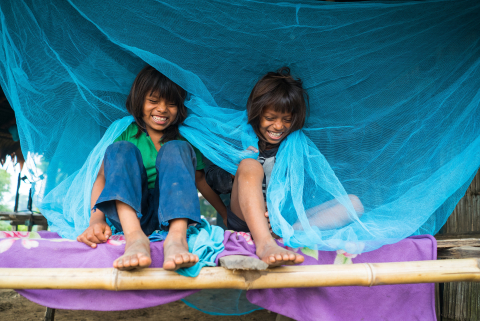Geneva, 28 October 2020--On the occasion of the 14th annual Malaria Day in the Americas, the RBM Partnership to End Malaria joins the Pan American Health Organization and other partners in honoring the communities across the region that have worked tirelessly to diagnose, treat, and prevent malaria in their area, as well as countries that continue their march towards elimination.
This year, five Malaria Champions of the Americas from Brazil, Colombia, Haiti and Honduras, have been selected for their commitment to protecting the achievements towards malaria elimination in the face of the COVID-19 pandemic. These communities are part of the regional “Municipalities for Zero Malaria” initiative that was inspired by the need to act more locally and more decisively to impact malaria in areas with the greatest burden.
Dr Abdourahmane Diallo, CEO of the RBM Partnership to End Malaria, said: “On behalf of the global malaria community, I applaud this year’s Malaria Champions of the Americas. Even as the region battles the COVID-19 pandemic, we have seen incredible progress as communities in Brazil, Colombia, Haiti and Honduras and entire nations such as Belize and El Salvador move closer to reaching—and staying at—zero malaria.”
Much like the global trend, progress against the achievement of in malaria burden reduction targets has been uneven across the Americas Region since 2015, mainly as a result of the massive increase in transmission and outbreaks in areas with complex socio-political and economic challenges, which were further compounded by the COVID-19 pandemic.
While some countries have achieved or are within reach of malaria elimination, others have seen malaria cases and deaths rise exponentially between 2015 and 2018.
Argentina and Paraguay have been certified by WHO as malaria-free, and El Salvador has completed three years without local malaria transmission and could be soon certified as malaria-free. Belize also had no local transmission in 2019, putting it on track to be certified as malaria-free in 2022.
Hispaniola, the last malaria endemic island of the Caribbean, has reduced cases by more than half since 2015 and is now well positioned to end malaria in the next several years.
Regional malaria initiatives, such as the Regional Malaria Elimination Initiative (RMEI) in Mesoamerica region and the Dominican Republic, play an important role in accelerating the fight against malaria by increasing cross border collaboration in surveillance; attracting new and pooling existing resources; creating efficiencies; and, improving primary health care along borders.
Malaria Day in the Americas is an important opportunity and mechanism for countries of the Americas Region to engage stakeholders in the fight against malaria. This year, the region is adapting the theme of World Malaria Day 2020: “Zero malaria starts with me.”
- ENDS -
Contact
To arrange an interview or find out more about the RBM Partnership to End Malaria, please contact the RBM Partnership Press Office on RBMPartnership@grayling.com or call +44 (0) 20 3861 3747.
For all the latest communications and resources about COVID-19 and malaria visit endmalaria.org/covid19andmalaria
About the RBM Partnership to End Malaria
The RBM Partnership to End Malaria is the largest global platform for coordinated action against malaria. Originally established as Roll Back Malaria (RBM) Partnership in 1998, it mobilises for action and resources and forges consensus among partners. The Partnership is comprised of more than 500 partners, including malaria endemic countries, their bilateral and multilateral development partners, the private sector, nongovernmental and community-based organisations, foundations, and research and academic institutions. The RBM Partnership Secretariat is hosted by the United Nations Office for Project Services (UNOPS) in Geneva, Switzerland. endmalaria.org
Facebook: @RBMPartnership
Twitter: @endmalaria
Photo credits: United Nations Foundation, Nothing But Nets
